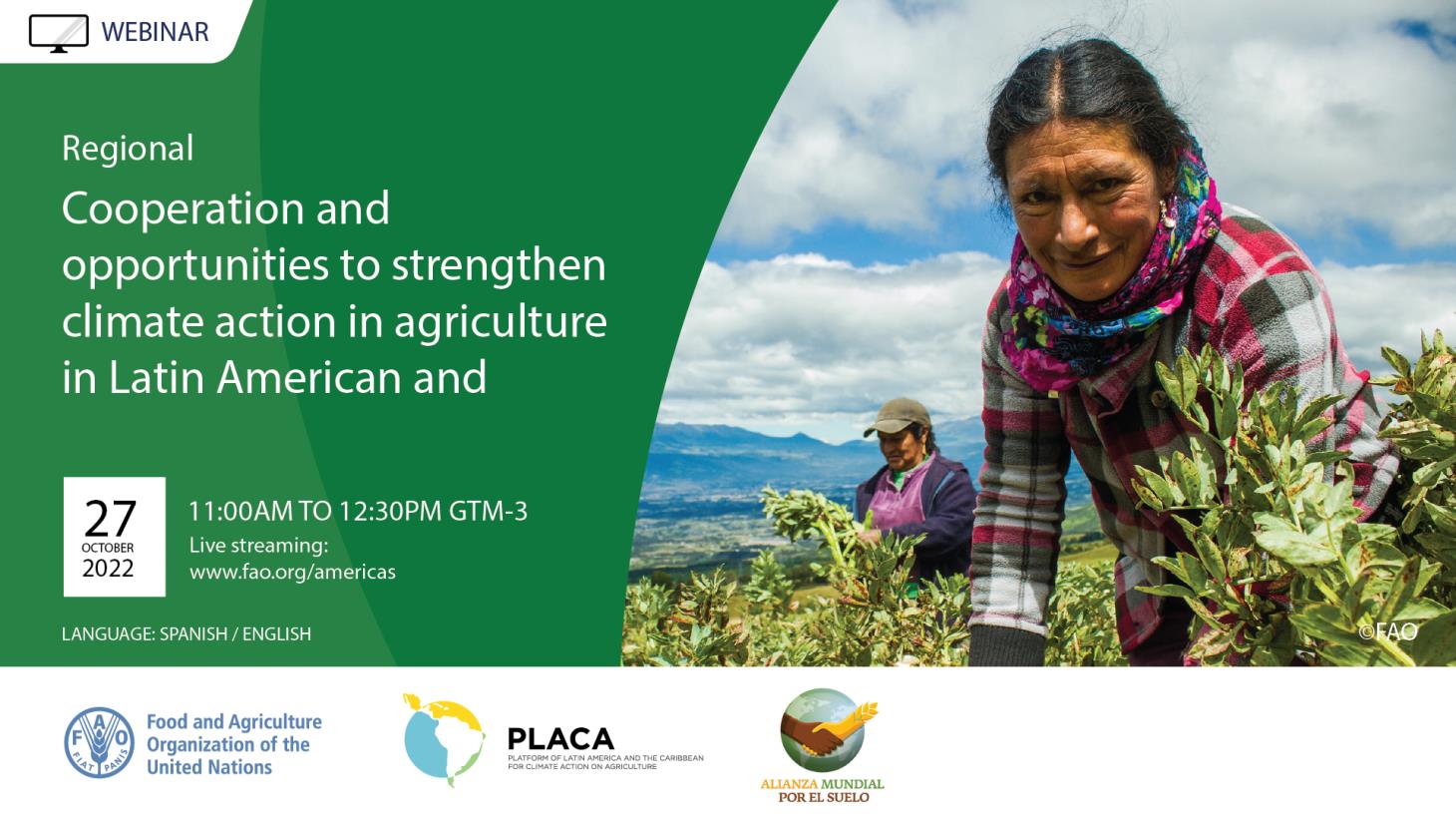Seminar Regional Dialogue: Cooperation and opportunities to strengthen climate action in agriculture in Latin America and the Caribbean
Hybrid Event, 27/10/2022

Latin America and the Caribbean (LAC) faces important environmental threats and challenges, such as water scarcity and drought, soil degradation, loss of biodiversity, deforestation, and natural phenomena and disasters, with impacts on the agri-food systems of the region and the ability to maintain its important role in the regional economy and in the global food supply.
The region represents 13% of the value of world production and agricultural and fishery products, and 17% of the net value of exports of these products, according to the publication OECD-FAO Agricultural Outlook 2021-2030.
Furthermore, agriculture in the region is highly vulnerable to the impacts of climate change. It is estimated that 40% of the total area of LAC will have reached or exceeded the threshold of 2 degrees of temperature increase in the next 11 years, and that by 2050 the entire region will be under a new climate regime, which will result in large impacts on rural livelihoods and food production. The reports of the Sixth Assessment Report (AR6) of the Intergovernmental Panel on Climate Change (IPCC) allude to the fact that climate change in the long term will affect agri-food systems, food production, rural livelihoods and related ecosystems in a variety of ways, and will require accelerated adaptation actions.
In addition, following the COVID-19 crisis, the war in Ukraine and the fertilizer crisis, countries seek to promote the transformation of agriculture and food systems while strengthening the resilience and sustainability of livelihoods based on food and agriculture. However, the participation of the agricultural sector in climate change negotiations is variable among the countries of the region: in some countries there is better integration, while in others the integration is low.
The strengthening of intersectoral work at the country level and regional blocks, alliances, regional cooperation, and South-South cooperation can support the creation of solutions to such challenges and promote the exchange of experiences and good practices for the common benefit. The solutions may lay on the political will of the parties and the availability of public policies and programs with a comprehensive approach to climate challenges, intersectoral environment-agriculture articulation and the adaptation of food systems.
Regional platforms: a mechanism for cooperation and exchange
The Platform for Climate Action in Agriculture in Latin America and the Caribbean (PLACA) provides support to strengthen national and regional strategies related to climate action in agriculture and brings together representatives of the Ministries of Agriculture of Argentina, Bahamas, Brazil, Chile, Costa Rica, Colombia, Guatemala, Haiti, Mexico, Panama, Peru, Uruguay and the Dominican Republic.
The Alliance for the Soil of Latin America and the Caribbean (ASLAC), aims to facilitate the exchange of knowledge and capacity building in information, capacity, investment and the environmental challenges faced by the countries of the region. Argentina, Bolivia, Brazil, Chile, Colombia, Ecuador, Paraguay, Peru, Uruguay, Venezuela, Belize, Costa Rica, Cuba, Dominican Republic, El Salvador, Guatemala, Haiti, Honduras, Mexico, Nicaragua, Panama, Bahamas , Grenada, Guyana, Haiti, Jamaica, Saint Lucia and Suriname are part of this platform.
Goal
To promote the exchange of experiences based on existing cooperation mechanisms in the region and influence the integration of the environment-agriculture sector as a prelude to the 27th Conference of the Parties to the United Nations Framework Convention on Climate Change (COP27).
This dialogue is part of the project "Response and recovery to the impact of COVID-19 on rural livelihoods and food systems in the countries of the Community of Latin American and Caribbean States (CELAC) through South-South Cooperation".
Program
|
Time |
Theme |
Exhibitor |
|
5' |
Welcome and general indications |
Moderator Ana Posas FAO Agriculture Officer for Latin America and the Caribbean. |
|
5' |
Opening and background |
Mario Lubetkin Deputy Director General and Regional Representative of FAO for Latin America and the Caribbean
|
|
10' |
The State of the Climate in Latin America and the Caribbean2022: Challenges and opportunities for the region |
WMO Regional Office for the Americas |
|
10' |
Platform for Climate Action in Agriculture in Latin America and the Caribbean (PLACA) |
Ministry of Agriculture and Livestock of Costa Rica.
|
|
10' |
Alliance for Soil in Latin America and the Caribbean (ASLAC) |
Secretariat of Agriculture and Development of the Government of Mexico.
|
|
10' |
Chile's experience in the intersectoral articulation of Environment and Agriculture |
Ministry of the Environment of Chile.
|
|
10' |
Advancing in the intersectoral integration of the environment and agriculture in the region of the Central American Integration System (SICA). AFOLU2040 Regional Initiative. |
Central American Commission for Environment and Development (SE CCAD) |
|
25' |
Round of questions to exhibitors |
Moderator Ana Posas |
|
5' |
Closing words |
|
Documents
Links of interest
Contact
Contacto especialista FAO
Ana Posas Guevara
Agriculture Officer
Contactos FAO comunicaciones
Martina Salvo
Communicator of the Regional Initiative for Sustainable and Resilient Agriculture. FAO Regional Office for Latin America and the Caribbean.
